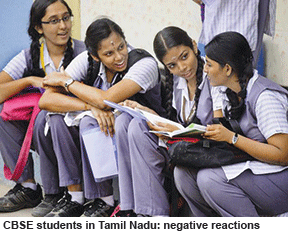A JUNE 30 CIRCULAR of the delhi-based Central Board of Secondary Education (CBSE) directing all its 15,000 affiliated schools countrywide to celebrate Sanskrit Week from August 7-13 has provoked hatred, ridicule and contempt in Tamil Nadu (pop: 72 million).
 According to the circular, “the celebration of Sanskrit Week would provide a medium for popularising Sanskrit and stimulating interest in the language, by increasing awareness about the close relationship between Sanskrit and other languages and the cultural heritage of India.” Advising school managements to organise Sanskrit-based competitions, the circular also encourages teachers to conduct research to explore links between Sanskrit and other Indian languages.
According to the circular, “the celebration of Sanskrit Week would provide a medium for popularising Sanskrit and stimulating interest in the language, by increasing awareness about the close relationship between Sanskrit and other languages and the cultural heritage of India.” Advising school managements to organise Sanskrit-based competitions, the circular also encourages teachers to conduct research to explore links between Sanskrit and other Indian languages.
Even within the 499 CBSE-affiliated schools in Tamil Nadu, the CBSE directive has evoked negative reactions. “Sanskrit does not have any relevance to contemporary education or life, and the presumption that it’s the mother of all languages, is debatable. There are many other important matters relating to the CBSE curriculum which need attention, other than popularising Sanskrit,” says Aarti Boaz, correspondent of the Boaz Public School, Chennai.
The CBSE directive comes a month after an uproar by Dravidian parties in the state over a Union home ministry order of May 27, asking all ministries and departments of the Central government to use Hindi in official communications and posts on social media. An outcry in the southern states against “Hindi imperialism” forced the home ministry to clarify that the order was applicable only to the Hindi-speaking states. Predictably, Dravidian political parties of Tamil Nadu including the Dravida Munnetra Kazhagam (DMK), Marumalarchi Dravida Munnetra Kazhagam (MDMK), and Pattali Makkal Katchi (PMK), born out of Tamil Nadu’s anti-Hindi agitations of the mid-1960s, have strongly opposed the Sanskrit Week celebration directive of CBSE.
The issue of the Sanskrit Week circular by CBSE — which is funded by the Central government — almost immediately after the Union home ministry issued its Hindi communication diktat and weak clarification, has raised doubts about the history awareness and/or obduracy of Union ministers Rajnath Singh and Smriti Irani who head the home and HRD ministries respectively. Tamil Nadu (and arguably all peninsular India states) has a long history of often violent resistance to imposition of Hindi as the national language stretching back to 1937.
The anti-Hindi agitation gained momentum after independence in 1947 when Periyar E.V. Ramaswamy opposed a proposal of the Congress government at the Centre to make Hindi compulsory in schools in all states from the academic year 1948-49. Continuous efforts by Hindi belt politicians-dominated Congress government to make Hindi the sole official language after 1965 as mandated by the Constitution, was resisted by Tamil Nadu and southern states on the ground that it would endow native Hindi speakers with a natural advantage in cornering all-India services jobs, while placing non-Hindi-speaking citizens at a disadvantage.
This prompted prime minister Jawaharlal Nehru’s Congress gov-ernment at the Centre to enact the Official Languages Act, 1963 to ensure continued use of English as an associate national language beyond 1965. However, southern skepticism that Nehru’s words would not be honoured after his death in 1964, prompted widespread rioting by students in 1965 in Madurai, which spread all over Madras and continued unabated for two months, subsiding only after Nehru’s successor, the late Lal Bahadur Shastri gave an assurance that English would continue to be used as the associate official language indefinitely.
Nevertheless, the anti-Hindi agitation of the mid-sixties completely transformed Tamil Nadu politics with the sub-nationalist Dravida Munnetra Kazhagam (DMK) routing the Congress party in the assembly election of 1967, after which the grand old party (Congress) has never been returned to power in Tamil Nadu. Moreover, in 1968 the obligation to learn Hindi was eliminated from the syllabuses prescribed for schools affiliated with the Tamil Nadu State Board of Secondary Education.
If despite this troubled history which half a century ago threatened the hard-won unity of post-independence India, the newly-inducted Modi government at the Centre dominated by leaders from the country’s most educationally backward states, has re-opened the national language can of worms, it’s a reflection of their history agnosticism or majoritarian mindset. Or both.
Hemalatha Raghupathi (Chennai)